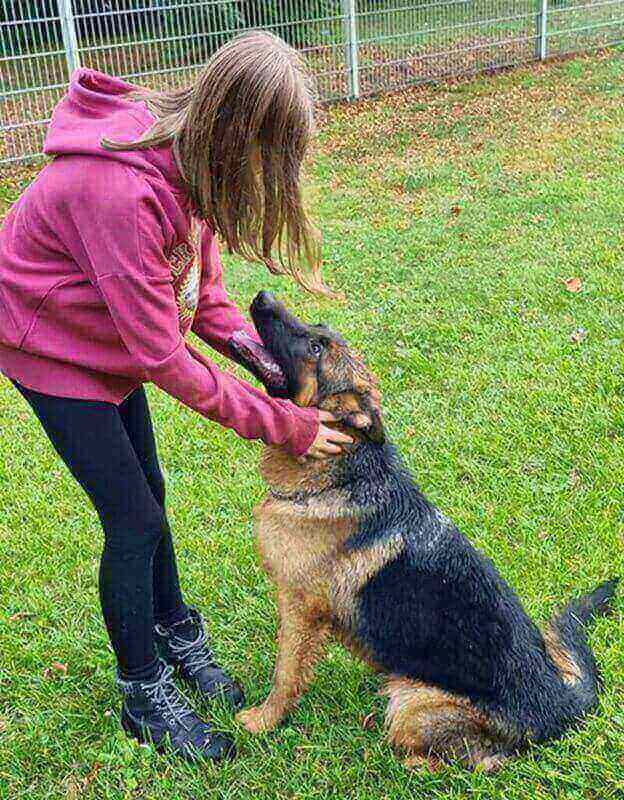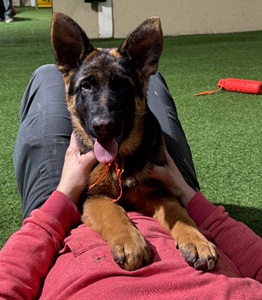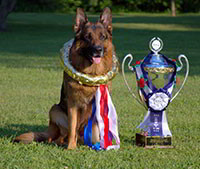Selecting the perfect dog for your family is a big decision. You want a loyal companion who brings joy, fits seamlessly into your home, and keeps everyone safe and happy. Questions like “Is a German Shepherd a good family dog?” often arise because families seek a breed that balances protection, affection, and adaptability. German Shepherds are intelligent, loyal, and naturally alert, making them a popular choice. By learning what this breed needs and how it behaves around children and adults, families can decide whether a German Shepherd is the right match for their household.

Get To Know The German Shepherd Breed
German Shepherds are a beloved breed known for their intelligence, strength, and versatility. Originally bred for herding, these dogs have evolved into trusted companions for families, law enforcement, and service roles. Their loyal temperament and trainability make them stand out as a breed that thrives in active, engaged households. However, their unique traits require thoughtful consideration to ensure they align with your family’s lifestyle.
As dedicated German Shepherd breeders, we know these dogs have a natural protective instinct, which makes them excellent guardians for homes with children or frequent visitors. Their alertness and confidence help them quickly assess situations, offering a strong sense of security. However, this same vigilance can be overwhelming for families unprepared for their energy and training needs. By understanding these traits, you can decide if this breed is right for you, and we provide well-bred German Shepherds that meet these qualities.
Address Common Pain Points
Families question whether a German Shepherd’s size, energy, or temperament aligns with a comfortable home environment. These concerns are reasonable, especially when choosing a breed that will live closely with children and adapt to daily routines. Exploring these common worries helps clarify what to expect and whether this strong, intelligent breed is a practical fit for your household.
Are German Shepherds Safe Around Children?
Many families hesitate, wondering if German Shepherds are too protective or intimidating for young children. When properly socialized, these dogs form strong bonds with kids, often becoming gentle, watchful companions. Their loyalty drives them to protect family members, but without early training, they may misinterpret playful behavior as a threat. This can lead to overprotective reactions, causing anxiety for parents.
Do German Shepherd Dogs Require Too Much Time?
German Shepherds are active, intelligent dogs that thrive on daily exercise, structured training, and mental challenges. Families with packed schedules may worry about falling short in meeting these needs. When under-stimulated, these dogs can become restless, leading to unwanted behaviors like digging, chewing, or excessive barking. This often frustrates owners who didn’t anticipate the breed’s energy level. Recognizing the time and commitment involved helps prevent problems and ensures the dog remains happy, engaged, and a positive addition to family life.
Will A German Shepherd Fit In A Small Home?
Families living in apartments or smaller houses may question whether a large, active dog like a German Shepherd can adapt to limited space. With an average weight of 50-90 pounds, these dogs need room to move and release energy. Without proper outlets, they can become restless or disruptive. While space is a valid concern, the real issue lies in daily activity. A well-exercised and mentally engaged German Shepherd can live comfortably, even in a smaller home.
Concerns about safety, time, and space are common when considering a German Shepherd as a family dog. While the breed has specific needs, people can manage many of these challenges through proper training, consistent routines, and active engagement. When families address these concerns early and realistically, a German Shepherd can grow into a devoted, well-adjusted companion.
Why A German Shepherd Is A Great Family Dog
Concerns about size, energy, and temperament can cause hesitation, but many German Shepherds thrive in family homes when raised in the right environment. Their loyal nature, intelligence, and emotional depth make them a rewarding choice for those willing to meet their needs. With proper structure, they adapt well to family life and offer lasting companionship.
Loyalty & Protection
German Shepherds are known for their devotion to their families. Their guard instincts ensure they’re always on alert, making them ideal for households seeking a watchful companion. With proper training, they distinguish between genuine threats and everyday situations, offering reassurance to parents. This reliability builds trust, knowing your home is under watchful eyes.
Intelligence & Trainability
Few breeds match the German Shepherd’s cognitive abilities. Their eagerness to learn makes them highly trainable, responding well to commands and routines. Families can teach them household rules, tricks, or even tasks like fetching items, which strengthens the bond between the dog and the owner. This mental engagement keeps them content and well-behaved.
Affectionate Companionship
Beneath their confident exterior, German Shepherds are deeply affectionate. They thrive on close relationships, forming tight connections with family members. Whether snuggling during movie nights or joining kids in the backyard, their warmth adds joy to daily life. This emotional connection makes them more than just pets; they become family.
German Shepherds offer a unique blend of protection, intelligence, and affection that suits many families. Their success as family dogs depends on structure, time, and engagement. For households ready to invest in training and daily care, this breed provides both emotional fulfillment and practical support, becoming a trusted and cherished member of the family.
Practical Solutions For Common Challenges
Raising a German Shepherd in a family setting comes with unique responsibilities. While this breed offers loyalty, intelligence, and companionship, it also requires consistent care and attention. The following strategies address common challenges and help families create a positive home environment for their German Shepherd.
Socialization For Safety
Early socialization is key to a well-adjusted German Shepherd. Expose them to children, other pets, and various environments from a young age to build confidence and reduce overprotectiveness. Arrange playdates, visit dog-friendly parks, or enroll in puppy classes to teach them appropriate behavior. Consistent exposure helps them adapt to family life.
Meeting Exercise Needs
German Shepherds need at least 60–90 minutes of daily physical activity. Combine walks, runs, or fetch games with mental challenges like puzzle toys or obedience training. For busy families, hire a dog walker or use a fenced yard for safe play. This keeps their energy levels balanced, preventing boredom-related issues.
Adapting To Small Spaces
In smaller homes, create a dedicated space for your German Shepherd dog with a comfortable bed and toys. Regular outdoor activities compensate for limited indoor space, ensuring they get enough movement. Training them to settle calmly indoors also helps manage their active nature. With structure, they can thrive in compact environments.
Is a German Shepherd a good family dog? When their needs are met with consistency and planning, the answer is often yes. German Shepherds bring strength, loyalty, and warmth to family life. By focusing on socialization, exercise, and managing space, families can create a routine that supports positive behavior and overall well-being.
Daily Habits That Support A Well-Adjusted Dog
 Helping a German Shepherd thrive in a family setting involves more than meeting basic needs. Consistent habits, thoughtful routines, and shared responsibilities all contribute to a strong, balanced relationship. These practical tips help prevent common challenges while creating a household where both the dog and family feel connected and supported.
Helping a German Shepherd thrive in a family setting involves more than meeting basic needs. Consistent habits, thoughtful routines, and shared responsibilities all contribute to a strong, balanced relationship. These practical tips help prevent common challenges while creating a household where both the dog and family feel connected and supported.
- Start Training Early: Begin obedience training as soon as your German Shepherd joins the family. Focus on basic commands like stay, sit, and come to build discipline.
- Create a Routine: Establish a daily schedule for feeding, exercise, and rest. Predictable routines reduce anxiety and help your dog feel secure in their environment.
- Involve the Family: Encourage all family members to participate in care tasks, such as feeding or walking. This strengthens the dog’s connection to everyone, promoting harmony.
- Monitor Health Needs: German Shepherds are prone to hip dysplasia and other health issues. Schedule regular vet visits and maintain a balanced diet to support their well-being.
- Provide Mental Stimulation: Use interactive toys, training games, or scent activities to keep their mind engaged. A stimulated dog is less likely to form behavioral problems.
Daily consistency and shared responsibility create the foundation for a happy, healthy German Shepherd. For families wondering, “Is German Shepherd a good family dog?”, these simple but effective practices offer a clear answer. With structure in place, the bond between the dog and household members grows stronger, setting the stage for years of loyalty and companionship.
Build A Lasting Bond With Your German Shepherd
At Mittelwest German Shepherd, we believe German Shepherds can be exceptional family dogs for those ready to invest time and love. Their loyalty, intelligence, and affection make them incredible companions, bringing security and joy to households. By addressing concerns like socialization, exercise, and space, families can create a thriving environment for their dog. We’re here to guide you every step of the way, ensuring you feel supported in this exciting journey.
Ready to welcome a German Shepherd into your family? Contact us for personalized advice or to discover more about our breeding programs. Let’s find the perfect companion for your home.













